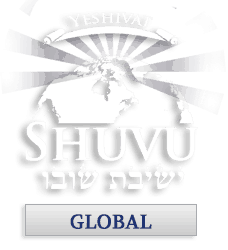עַשֵּׂ֣ר תְּעַשֵּׂ֔ר אֵ֖ת כָּל־תְּבוּאַ֣ת זַרְעֶ֑ךָ הַיֹּצֵ֥א הַשָּׂדֶ֖ה שָׁנָ֥ה שָׁנָֽה: וְאָֽכַלְתָּ֞ לִפְנֵ֣י | יְהֹוָ֣ה אֱלֹהֶ֗יךָ בַּמָּק֣וֹם אֲשֶׁר־יִבְחַר֘ לְשַׁכֵּ֣ן שְׁמ֣וֹ שָׁם֒ מַעְשַׂ֤ר דְּגָֽנְךָ֙ תִּֽירשְׁךָ֣ וְיִצְהָרֶ֔ךָ וּבְכֹרֹ֥ת בְּקָֽרְךָ֖ וְצֹאנֶ֑ךָ לְמַ֣עַן תִּלְמַ֗ד לְיִרְאָ֛ה אֶת־יְהֹוָ֥ה אֱלֹהֶ֖יךָ כָּל־הַיָּמִֽים: וְכִֽי־יִרְבֶּ֨ה מִמְּךָ֜ הַדֶּ֗רֶךְ כִּ֣י לֹ֣א תוּכַל֘ שְׂאֵתוֹ֒ כִּֽי־יִרְחַ֤ק מִמְּךָ֙ הַמָּק֔וֹם אֲשֶׁ֤ר יִבְחַר֙ יְהֹוָ֣ה אֱלֹהֶ֔יךָ לָשׂ֥וּם שְׁמ֖וֹ שָׁ֑ם כִּ֥י יְבָֽרֶכְךָ֖ יְהֹוָ֥ה אֱלֹהֶֽיךָ: וְנָֽתַתָּ֖ה בַּכָּ֑סֶף וְצַרְתָּ֤ הַכֶּ֨סֶף֙ בְּיָ֣דְךָ֔ וְהָֽלַכְתָּ֙ אֶל־הַמָּק֔וֹם אֲשֶׁ֥ר יִבְחַ֛ר יְהֹוָ֥ה אֱלֹהֶ֖יךָ בּֽוֹ: וְנָֽתַתָּ֣ה הַכֶּ֡סֶף בְּכֹל֩ אֲשֶׁר־תְּאַוֶּ֨ה נַפְשְׁךָ֜ בַּבָּקָ֣ר וּבַצֹּ֗אן וּבַיַּ֨יִן֙ וּבַשֵּׁכָ֔ר וּבְכֹ֛ל אֲשֶׁ֥ר תִּשְׁאָֽלְךָ֖ נַפְשֶׁ֑ךָ וְאָכַ֣לְתָּ שָּׁ֗ם לִפְנֵי֙ יְהֹוָ֣ה אֱלֹהֶ֔יךָ וְשָֽׂמַחְתָּ֖ אַתָּ֥ה וּבֵיתֶֽךָ:
You shall tithe all the seed crop that the field gives forth, year by year. And you shall eat before the Lord, your God, in the place He chooses to establish His Name therein, the tithes of your grain, your wine, and your oil, and the firstborn of your cattle and of your sheep, so that you may learn to fear the Lord, your God, all the days. And if the way be too long for you, that you are unable to carry it, for the place which the Lord, your God, will choose to establish His Name therein, is too far from you, for the Lord, your God, will bless you. Then you shall turn it into money, and bind up the money in your hand, and you shall go to the place the Lord, your God, will choose. And you shall turn that money into whatever your soul desires; cattle, sheep, new wine or old wine, or whatever your soul desires, and you shall eat there before the Lord, your God, and you shall rejoice, you and your household.
Deuteronomy 14:22-26
This parasha, as with many in Deuteronomy, contains a great many mitzvot. In chapter 14, we see in verses 22-26 the mitzvah of the second tithe. The commandment of the second tithe is that we set aside ten percent of food to be in Jerusalem during the pilgrimage festivals.
Normally we think of the tithe as money that we give away, so it is a bit odd to think about money that we use as being a tithe. But the commandment is quite clear, we set aside money all during the year to be used specifically in Jerusalem for food when we visit during Pesach, Shavuot, and Succot. In reality, it is quite like a vacation fund. We are supposed to visit Jerusalem and the commandment of this type insures that we have sufficient funds to do so at the appointed times.
Similar to the first tithe, which we can commemorate by giving to our local synagogue, we can commemorate the second tithe as well. We can set aside funds to visit Israel and spend it there every year. Just as we are commanded to spend ten percent of our income for our pilgrimages to Jerusalem and the temple, so we can set aside money all through the year in order to visit Jerusalem, even though no temple exists today.
Another mitzvah that is interestingly connected to the second tithe is found in verse 16:16. When we go to Jerusalem during these pilgrimage festivals, we are not to appear empty-handed. This is the commandment for the Chagiga, the Festival offering. The Chagiga is an offering that all males are to bring during each of the festivals: Pesach, Shavuot, and Succot. This offering is brought in addition to the other offerings commanded for these festivals. An entire tractate of Talmud is dedicated to the Chagiga. The Chagiga is a type of Shlamim, “peace” offering. Part of the sacrifice is for a pleasing aroma to Hashem, part of the offering is eaten by the Kohayns, and part of the offering is eaten by the bringer of the offering. One question debated in tractate Chagiga is whether money from the second tithe may be used to purchase the Chagiga offering. The determination is interesting. One Chagiga must be brought by every male, however, more than one Chagiga may be brought as one wishes. Therefore, the first Chagiga, the required one, must be purchased with funds outside of the second tithe. Additional Chagiga offerings may be purchased with money from the second tithe.
Another important aspect of the Chagiga is that every male must bring it. Therefore, it constitutes the majority of the Festival meal for each of the pilgrimage festivals. This includes Pesach, with the majority of the food of the Seder being from the Chagiga offering. The Pesach offering was reserved until the end of the meal in order to assure that everyone present did in fact eat a piece of the Pesach, but the bulk of the meal was in fact the Chagiga offering.
Shabbat shalom.
